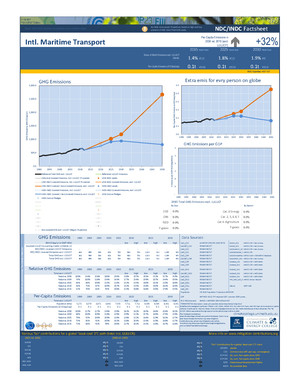Intl. Maritime Transport
Intl. Maritime Transport
Factsheet
International Maritime Transport has no emission reduction target (yet) under the UNFCCC. Similarly, the international regulatory body for international maritime transport (IMO) has not yet announced any target. IMO has released its IMO Third GHG study in 2014, which contains a range of future scenarios, on which our factsheet is based. For further information on intetnational maritime transport targets, see e.g. this study by Cames et al. Note that the per-capita emissions are not directly comparable to either those displayed for international aviation or other countries. They are average extra emissions for every person on the planet, if the shipping emission services could equally be attributed to every person on the planet (they can not).
- Change of per-capita emissions from 2010 to 2030 (average): +33%
- Per-capita emssions in 2030 (average): 0.1 tCO2/eq
- Global rank of national emissions excl. landuse (out of 195 countries): #14 in 2010 and #8in 2030.
See our full evaluation in the Factsheet.

In addition to the above default Factsheets, we produced Factsheets with alternative data sources and metrics to compare the different greenhouse gases. They are:
| Attachment | Size |
|---|---|
| 472.21 KB | |
| 472.21 KB |
Summary of all NDC & INDC Factsheets and methodologies
Disclaimer & Comments
Due to the size and quality of the underlying data-sets (and in some cases the "fuzziness" of the NDC or INDCs) we have not been able to produce "perfect" Factsheets every time. Please leave a comment if you find a glaring mistake or if you want to share an opinion about the NDC or INDC. Please be respectful.
Web tools and Projects we developed
Open-NEM
The live tracker of the Australian electricity market.
Paris Equity Check
This website is based on a Nature Climate Change study that compares Nationally Determined Contributions with equitable national emissions trajectories in line with the five categories of equity outlined by the IPCC.
liveMAGICC Climate Model
Run one of the most popular reduced-complexity climate carbon cycle models online. Used by IPCC, UNEP GAP reports and numerous scientific publications.
NDC & INDC Factsheets
Check out our analysis of all the post-2020 targets that countries announced under the Paris Agreement.